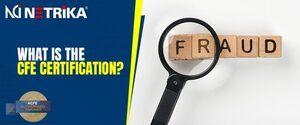More from Netrika Counsulting
More in Politics
Related Blogs
Les archives
Partage Social
Corps
The CFE certification process involves joining the ACFE and then passing an exam that tests for knowledge and proficiencies in four areas:
- Fraud Prevention & Deterrence
- Financial Transactions & Fraud Schemes
- Investigation Methods
- Civil & Criminal Law
The Certified Fraud Examiner (CFE) certification equips professionals with specialized expertise in detecting, deterring, and investigating fraud. Administered by the Association of Certified Fraud Examiners (ACFE), it validates proficiency in areas such as fraud prevention, financial transactions, and legal matters. Achieving CFE status demonstrates a commitment to combating fraud effectively. Our CFE certificate course allows the participant to gain professional visibility and credibility while enhancing their marketability and job security across the globe. With an instructor-led CFE training course, Netrika empowers and generates awareness for both a professional and the organization to impede potential frauds and limit the risk of the one that has already impacted the entity.
The Certified Fraud Examiner qualification from ACFE is an internationally recognized credential, designed for professionals who are involved in the detection and deterrence of fraud. Before obtaining the CFE from ACFE India, the professionals need to demonstrate their ability to handle fraudulent activities in an organization through relevant experience. It is this element of ACFE, that makes it a global leader in imparting anti-fraud specialist training.
Moreover, the certification provides a professional with the specialist training that they would require in the practical world to detect, prevent, as well create a robust background in the legal terms of the organization. With a wide presence, expansive applicability and stringent regulations, ACFE certification enable a professional to gain a career boost.
What is a Certified Fraud Examiner (CFE)?
A Certified Fraud Examiner (CFE) is a specialist trained to identify, deter, and investigate fraudulent activities across various sectors. Accredited by the Association of Certified Fraud Examiners (ACFE), CFEs possess a comprehensive understanding of financial transactions, legal frameworks, and fraud prevention techniques. They play a crucial role in safeguarding organizations from financial malpractice, corruption, and white-collar crime. Through rigorous examination and continuous professional development, CFEs acquire the skills and knowledge necessary to uncover complex schemes, analyze evidence, and support legal proceedings. Their expertise contributes significantly to maintaining integrity, trust, and compliance within both public and private sectors worldwide.
What is the CFE Exam?
The CFE Exam is a closed-book and closed-notes exam comprised of four sections, each containing 100 multiple choice questions. Exam takers have a two-hour time limit on each section. Each exam is generated from a master database; no two exams are exactly alike.
The CFE Exam is a rigorous assessment conducted by the Association of Certified Fraud Examiners (ACFE) to certify professionals in fraud detection, prevention, and investigation. It covers four main areas: Fraud Prevention and Deterrence, Financial Transactions and Fraud Schemes, Investigation Methods, and Legal Elements of Fraud. Candidates must demonstrate proficiency in each domain to pass the exam. Preparation involves studying fraud examination principles, practical experience, and ethical considerations. Passing the CFE exam signifies expertise in combating fraud effectively across industries, enhancing career opportunities, and contributing to maintaining integrity and trust within organizations.
About the CFE Exam
- The CFE exam covers four main areas: Fraud Prevention and Deterrence, Financial Transactions and Fraud Schemes, Investigation Methods, and Legal Elements of Fraud.
- Candidates must demonstrate proficiency in each area to pass the exam.
- Preparation involves studying fraud examination principles, practical experience, and ethical considerations.
- The exam assesses knowledge of detecting and deterring fraudulent activities.
- Understanding various fraud schemes is essential for success.
- Mastery of investigative techniques, including data analysis and evidence collection, is crucial.
- Familiarity with legal aspects related to fraud, such as laws and regulations, is necessary.
- Passing the CFE exam signifies expertise in combating fraud effectively across industries.
CFE Exam Format Options
To provide you with the testing experience that matches your personal preference, there are several formats to choose from when taking the CFE Exam.
- In person at a CFE Exam Review Course: Attendees have the option of taking the exam onsite at an in-person course. Learn more about advanced preparation, application requirements and deadlines, as well as details for taking the CFE Exam onsite.
- In person at a Prometric testing center: Prometric operates the world’s largest network of computer-based assessment centers that provide convenient access to test takers.
- Online with a remote proctor: Through Prometric’s ProProctor online platform, you can take the CFE Exam from the comfort of your own home without having to travel or test near other people.
What Does a Certified Fraud Examiner Do?
A CFE is a trained professional who investigates financial records to find fraudulent activities or other types of financial crimes.” And just as Sherlock Holmes never has the same day twice, there is no typical day for CFEs. They can work in a variety of positions, businesses and industries.










commentaires